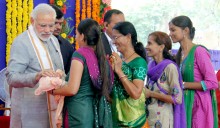Nehruvian strong handed centralization coupled with bureaucratic despotism will be the future of India under the newly elected Indian Prime Minister, Narendra Modi. Despite being, what many would say, the antithesis of a secular Jawaharlal Nehru, Modi has demonstrated several tendencies of Nehru-like micromanagement during his first hundred days in office. These thoughts were expressed by Sameer Saran, Vice President and Senior Research fellow at the Observer Research Foundation, while delivering an emphatic talk on ‘Narendra Modi and his Foreign Policy Objectives’, hosted by the Centre of South Asian Studies at the Munk School of Global Affairs on October 2, 2014.
Restoration of a strong executive space and empowering of the bureaucracy, characteristic of Nehru’s India, will mark the return of the Babu – a metaphor for technocrats that historically constituted India’s bureaucratic steel framework. Saran holds the belief that Modi’s superstar persona (as seen in his recent drawing of several thousand members of the Indian Diaspora at the Madison Square Gardens), will suffice to press the ‘reset button’ on the prevailing negative investor confidence surrounding India. This can be largely accredited to Modi’s approach towards ensuring neo-liberal economic space, creating market access and ensuring a creation of jobs – a far cry from the garland of communal Hindu nationalism he adorned during his time as the Chief Minister of the Indian State of Gujarat.
A larger section of Mr. Saran’s lecture centred around India’s Foreign Policy aspirations given its role as an emerging regional and global power. Modi’s drift towards realpolitik in internal governance is also manifested in his external relations strategy. The policy of ‘India First’ – implying a clean up the internal mess first – however has not curtailed India’s global ambitions. A recent visit by the Chinese premier opened several new avenues of cooperation. Moreover, India has begun to see its neighbourhood in an extended sense. Enhancing investment in the ASEAN region; conceding to Bangladesh in an old water dispute; recent visits to Nepal and Bhutan; and newfound enthusiasm in interacting with Japan and Australia, are all parts of Modi’s efforts to have India assert itself regionally. India, under Modi, has also demonstrated flexibility in dealing with the BRICS, by understanding the value of accepting Shanghai as the economic headquarters. Modi’s Pakistan policy however remained ill-defined, with a seemingly unchanged plan to maintain the status quo. Some of the greatest anti-Pakistan vitriol emanates from his own party, and if Modi is to challenge the bilateral stalemate with Pakistan, a shift in opinion within his own ranks is necessitated.
Mr. Saran’s lecture portrayed Narendra Modi as the provider of much needed salvation for India. While Modi’s dynamism and pro-business and anti-corruption attitude may provide India some impetus after nearly half a decade of stagnation, transforming a country of 1.3 billion people may not be a task as easy as making populist electoral promises. With just over a hundred days in office, whether Narendra Modi can make a Nehru out of himself is yet to be seen.
-written by S. Taha H. Shah, a third year student in the Contemporary Asian Studies Program
This article is part of a series of articles written by undergraduate students affiliated with the Asian Institute about events hosted by the Asian Institute.
